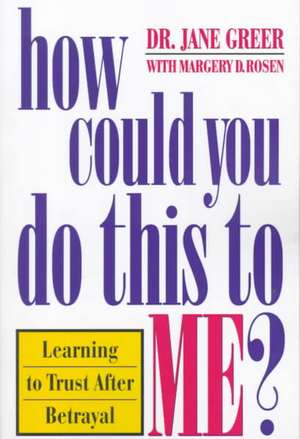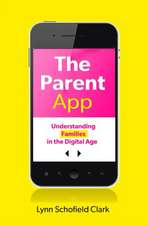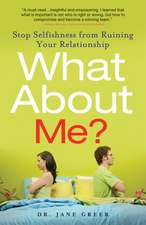How Could You Do This to Me?
Autor Jane Greer, Margery D. Rosenen Limba Engleză Paperback – 31 iul 1998
In How Could You Do This to Me?, Dr. Jane Greer teaches readers:the types of people who are more at risk of betrayal the warning signs of someone who is untrustworthy a process that helps decide whether a relationship is worth saving or whether it should be abandoned.Part One discusses the roots of trust, blind trust, and the reasons betrayers betray. Part Two reveals our betrayers' many faces: admirers, users, or rivals. Part Three focuses on the fallout from betrayal: confrontation, revenge, and betrayal, and talks about how you can learn to trust your judgment and others again.
Preț: 106.23 lei
Nou
Puncte Express: 159
Preț estimativ în valută:
20.33€ • 22.15$ • 17.13£
20.33€ • 22.15$ • 17.13£
Carte disponibilă
Livrare economică 03-17 aprilie
Preluare comenzi: 021 569.72.76
Specificații
ISBN-13: 9780385490115
ISBN-10: 0385490119
Pagini: 222
Dimensiuni: 140 x 209 x 16 mm
Greutate: 0.22 kg
Editura: Main Street Books
ISBN-10: 0385490119
Pagini: 222
Dimensiuni: 140 x 209 x 16 mm
Greutate: 0.22 kg
Editura: Main Street Books
Notă biografică
Dr. Jane Greer is a nationally renowned marriage and family therapist, in private practice for more than twenty years. A former adjunct assistant professor at Adelphi University School of Social Work, Dr. Greer is also the coauthor of Adult Sibling Rivalry. Dr. Greer lectures across the country on marital, sexual, and family problems, as well as on women's and sibling issues. She is a frequent guest expert on numerous national TV programs and is often interviewed by publications such as USA Today, The New York Times, Ladies' Home Journal, and Redbook. Her practice is in Manhattan.
Margery D. Rosen is a veteran freelance writer and editor who specializes in relationship, family, and parenting issues. Her articles have won awards from the American Medical Association and the American Psychiatric Association. She lives in New York City.
From the Hardcover edition.
Margery D. Rosen is a veteran freelance writer and editor who specializes in relationship, family, and parenting issues. Her articles have won awards from the American Medical Association and the American Psychiatric Association. She lives in New York City.
From the Hardcover edition.
Extras
Time and again, people you love, respect, and count on--lovers, family, friends, or colleagues--behave in ways that wound you deeply, shake your faith in them and in yourself, and tear at the fabric of your relationships. It's not easy for anyone to live with betrayal, large or small. Though you may understand it intellectually, emotionally you are scalded by the broken trust.
Mention the word trust or betrayal, and most people think immediately of sexual infidelity. While an affair is certainly a devastating betrayal of trust, it is only one of the many types of betrayals I will deal with in this book. Some betrayals are deliberate; others, unplanned. They are triggered by words said and actions taken, as well as by those which remain unspoken and covert. A betrayer may openly deceive by taking obvious stabs at your character or status. He may tell you one thing but do something else, or pretend to care while neglecting your well-being and polluting your trust with omissions and lies. Or he may betray in a way that is subtle and hard to pinpoint, by tacitly agreeing to another's negative opinion of you, or simply by failing to be there for you when you fully anticipate that he will.
Betrayals are fueled by many forces, too--by jealousy, anger, and competition--but, surprisingly, the desire to hurt is not always one of them. Betrayers may actually wish to help you and then feel unjustly accused when you cast doubt on their credibility and motives. They may think they're being caring and protective, and that their behavior is vindicated by their admirable intentions. Do they do what they do intentionally or unwittingly? How do they live with themselves? More important, how do you live with them?
OUR CHEATIN' HEARTS
In my private practice, I often see people reeling from the pain of betrayal. Indeed, it's hard to ignore the trust gap that slices through nearly every corner of society. Be it government, industry, education, medicine, Hollywood, sports, or the media, people and institutions we thought we could trust often turn out to be riddled with dishonesty, deception, lying, waffling, quibbling, or some other sideways bending of the truth. Though cultural historians may note that untrustworthy personal and professional relationships have been with us since time immemorial, these days they do seem more pervasive and insidious than ever.
Pollsters report that most Americans believe there is less honesty today than there was even a decade ago. Certainly, television and radio talk shows confirm that perception, with daily tales of betrayal--vows and promises broken, expectations gone haywire, relationships allowed to wither. We watch and listen as victims say that they feel alone and abandoned--adrift without an emotional compass. We watch and listen--partly with fascination, partly with empathy--because, on some level, in some way, we have all experienced their anguish. And we wonder: In a nation of adulterers, liars, swindlers, and cheaters, is being happy, rather than honorable, the New American Dream? Is there anyone we can count on?
Even more disturbing is that many victims have no idea how to conquer their rage, regain their dignity, and move past the trauma of broken trust. Like a paper cut, betrayal of any kind is painful, but you may tell yourself it's only a small wound, one that hurts now but will soon heal."I'm probably making too big a deal out of this," you say, with a decided lack of conviction. And so you accept the betrayal and try hard not to let it bother you.
But it does bother you--a lot. After all, when you get cut over and over again in the same place, a small nick becomes an enduring wound that can leave a permanent scar.
THE LEGACY OF TRUST
Yet here's the paradox. Despite the dim view of what's happening in the outside world, most Americans still rank trust high on their list of virtues, invariably citing it as the most important quality they seek in a relationship--personal or professional. Indeed, to be able to trust fully is the single most important criterion for a lasting, deeply satisfying relationship. However, to trust is an active, not a passive, process. Trust can be lost, but it can also be regained.
This book is for anyone who has ever felt betrayed, abandoned, ignored, or let down by someone he trusted. No matter how badly a betrayal has wounded you, you can use what you learn here to achieve three important goals.
First, you'll be able to determine clearly what trust means to you. Once you do, you'll be better equipped to evaluate the character of the people you are dealing with--spouse or lover, family members, friends, colleagues. You'll be able to spot the warning signs that someone you trust may actually be untrustworthy, and you'll be able to anticipate emotional blackmail in all its guises.
Second, you'll be able to recognize the personal risk factors that leave you vulnerable to broken trust. Once you understand the emotional needs stemming from your past that propel you toward unstable relationships, you can shift your unrealistic expectations to more reasonable ones and protect yourself against future betrayals. Instead of feeling gullible and defenseless, you'll feel informed and powerful--capable of trusting your instincts once again.
And third, you'll learn how to manage the fallout from betrayal--when and how to confront someone who has broken your trust; when and how to let go of grudges; and when to forgive, if possible, and move on with your life. You'll shift from feeling hopeless and helpless to feeling purposeful and strong. Armed with newfound knowledge and practical, workable techniques, you can overcome the hurt, anger, and vengeful feelings that swamp you when trust is breached, and rebuild a shattered self-confidence that affects every area of your life.
Most important, rather than trusting everyone--or trusting no one you can begin to forge and maintain healthy, nurturing relationships on every level.
From the Hardcover edition.
Mention the word trust or betrayal, and most people think immediately of sexual infidelity. While an affair is certainly a devastating betrayal of trust, it is only one of the many types of betrayals I will deal with in this book. Some betrayals are deliberate; others, unplanned. They are triggered by words said and actions taken, as well as by those which remain unspoken and covert. A betrayer may openly deceive by taking obvious stabs at your character or status. He may tell you one thing but do something else, or pretend to care while neglecting your well-being and polluting your trust with omissions and lies. Or he may betray in a way that is subtle and hard to pinpoint, by tacitly agreeing to another's negative opinion of you, or simply by failing to be there for you when you fully anticipate that he will.
Betrayals are fueled by many forces, too--by jealousy, anger, and competition--but, surprisingly, the desire to hurt is not always one of them. Betrayers may actually wish to help you and then feel unjustly accused when you cast doubt on their credibility and motives. They may think they're being caring and protective, and that their behavior is vindicated by their admirable intentions. Do they do what they do intentionally or unwittingly? How do they live with themselves? More important, how do you live with them?
OUR CHEATIN' HEARTS
In my private practice, I often see people reeling from the pain of betrayal. Indeed, it's hard to ignore the trust gap that slices through nearly every corner of society. Be it government, industry, education, medicine, Hollywood, sports, or the media, people and institutions we thought we could trust often turn out to be riddled with dishonesty, deception, lying, waffling, quibbling, or some other sideways bending of the truth. Though cultural historians may note that untrustworthy personal and professional relationships have been with us since time immemorial, these days they do seem more pervasive and insidious than ever.
Pollsters report that most Americans believe there is less honesty today than there was even a decade ago. Certainly, television and radio talk shows confirm that perception, with daily tales of betrayal--vows and promises broken, expectations gone haywire, relationships allowed to wither. We watch and listen as victims say that they feel alone and abandoned--adrift without an emotional compass. We watch and listen--partly with fascination, partly with empathy--because, on some level, in some way, we have all experienced their anguish. And we wonder: In a nation of adulterers, liars, swindlers, and cheaters, is being happy, rather than honorable, the New American Dream? Is there anyone we can count on?
Even more disturbing is that many victims have no idea how to conquer their rage, regain their dignity, and move past the trauma of broken trust. Like a paper cut, betrayal of any kind is painful, but you may tell yourself it's only a small wound, one that hurts now but will soon heal."I'm probably making too big a deal out of this," you say, with a decided lack of conviction. And so you accept the betrayal and try hard not to let it bother you.
But it does bother you--a lot. After all, when you get cut over and over again in the same place, a small nick becomes an enduring wound that can leave a permanent scar.
THE LEGACY OF TRUST
Yet here's the paradox. Despite the dim view of what's happening in the outside world, most Americans still rank trust high on their list of virtues, invariably citing it as the most important quality they seek in a relationship--personal or professional. Indeed, to be able to trust fully is the single most important criterion for a lasting, deeply satisfying relationship. However, to trust is an active, not a passive, process. Trust can be lost, but it can also be regained.
This book is for anyone who has ever felt betrayed, abandoned, ignored, or let down by someone he trusted. No matter how badly a betrayal has wounded you, you can use what you learn here to achieve three important goals.
First, you'll be able to determine clearly what trust means to you. Once you do, you'll be better equipped to evaluate the character of the people you are dealing with--spouse or lover, family members, friends, colleagues. You'll be able to spot the warning signs that someone you trust may actually be untrustworthy, and you'll be able to anticipate emotional blackmail in all its guises.
Second, you'll be able to recognize the personal risk factors that leave you vulnerable to broken trust. Once you understand the emotional needs stemming from your past that propel you toward unstable relationships, you can shift your unrealistic expectations to more reasonable ones and protect yourself against future betrayals. Instead of feeling gullible and defenseless, you'll feel informed and powerful--capable of trusting your instincts once again.
And third, you'll learn how to manage the fallout from betrayal--when and how to confront someone who has broken your trust; when and how to let go of grudges; and when to forgive, if possible, and move on with your life. You'll shift from feeling hopeless and helpless to feeling purposeful and strong. Armed with newfound knowledge and practical, workable techniques, you can overcome the hurt, anger, and vengeful feelings that swamp you when trust is breached, and rebuild a shattered self-confidence that affects every area of your life.
Most important, rather than trusting everyone--or trusting no one you can begin to forge and maintain healthy, nurturing relationships on every level.
From the Hardcover edition.
Descriere
Betrayal shatters self-esteem, making us feel unsafe emotionally, physically, and financially. Writing with intelligence and compassion, the authors use stories to illustrate the different situations in which we may be betrayed--by opportunistic work colleagues, unfaithful lovers, admirers, friends, and family.













